Down with the Jazz
Mohill marks the famous Anti-Jazz Campaign of New Year’s Day 1934
Arrival of Jazz
‘When the generation of old people die out, we will have a different type of people’. In 1933, Fr Peter Conefrey, parish priest of Cloone, was not anticipating the impact of social media or the dangers of video games. Instead, he was fearful about the loss of Ireland’s traditional music and dancing, and its replacement with foreign imports like Jazz.
Across Europe and America, the end of the Great War heralded a new era of moral freedom – or the collapse of civilisation – depending on one’s perspective. The new openness crossed the Atlantic, and people throughout the country began to enjoy the liberation of a nascent dance band era. ‘Jazz’ became an umbrella term for all modern music and for dances like the Samba, Quickstep and Rhumba.
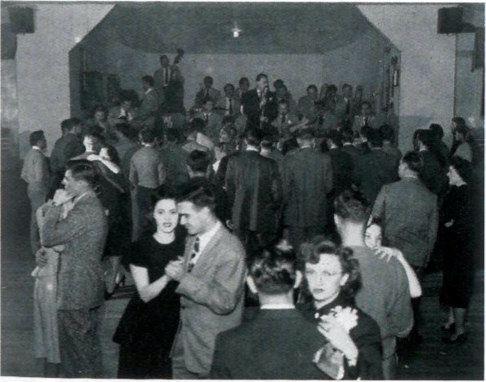
'This engine of hell'
Leaders of the church, state and cultural nationalists coalesced to fight against this ‘abominable’ foreign music: the Gaelic League sought to counter the neglect and destruction of Irish traditions, while the government worried about how to protect the morality of young people against foreign music. Fr Conefrey spoke for many when he said that Jazz was a menace to religion, morality and nationality and that Jazz – ‘this engine of hell’ – with its ‘copulative beat, beat, beat of the drum, stirred up forces all over the world’, and was being used by Bolshevists to destroy Christian civilization. Locally, in August 1933, Jimmy Gralton, who had facilitated young people in their new-found entertainment, was deported for his sins after being arrested in Gorvagh. (Read more about Jimmy Gralton here >>>)
As the year closed, an Anti-Jazz campaign gained momentum, with Fr Conefrey and Leitrim at its centre. As well as calling for a halt to Jazz, Fr Conefrey called for a new National Reconstruction League to take charge of the language, music, dance, and other arts and cottage industries.
Down with Jazz
On New Year’s Day 1934, over three thousand local people marched through Mohill in an event that marked the beginning of a national Anti-Jazz campaign. The marchers were accompanied by five bands and some carried banners and placards with slogans such as ‘Down with Jazz’ and ‘Out with Paganism.’
The march began at the Station House and proceeded up Main Street to a meeting at the Canon Donohoe Hall led by Fr Conefrey and Canon Masterson, parish priest of Mohill. Both priests spoke, and supportive messages were read out from people like Cardinal MacRory, Éamon de Valera, and Douglas Hyde. MacRory specifically wished the group success in their fight against all night Jazz dancing which led to ‘irreparable disgrace and life-long sorrow’ for many innocent young women; de Valera sent his regrets and wished the Gaelic League success in restoring ‘the national forms of dancing’; Douglas Hyde hoped that, in future, all dances and games would be Irish.
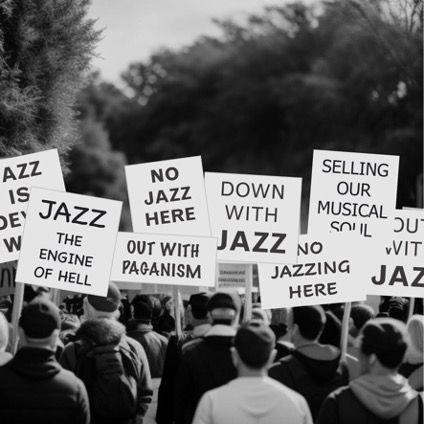
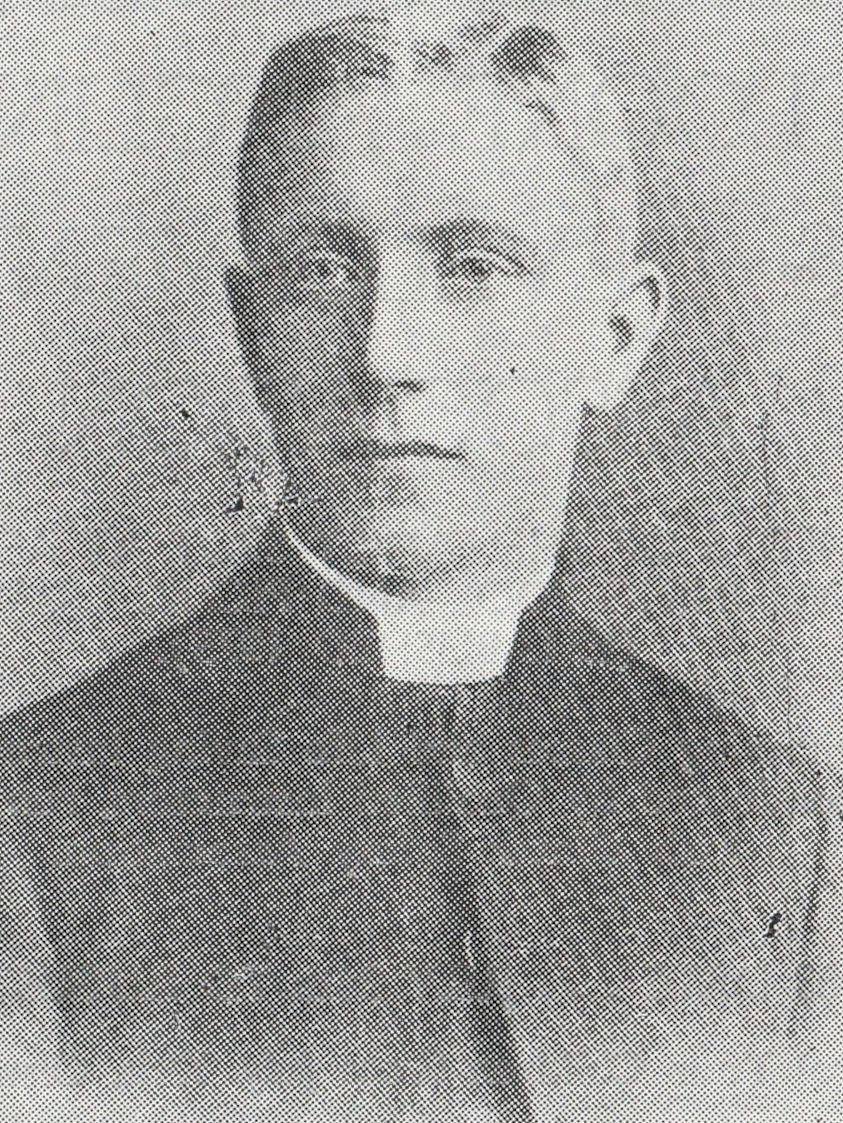
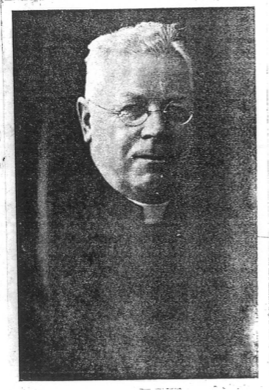
A menace to civilisation
Canon Masterson told the crowd that Jazz was a menace to their very civilisation as well as their religion. Fr Conefrey declared that Jazz was ‘an even greater evil than both intemperance and landlordism combined’, and called for concerted action by church and state. He said the government should compel the closing of dance halls at 11 o‘clock, and there should be teaching and training in Irish dancing and music for teachers and amongst the members of the Guards. The crowd was told that the Guards and GAA clubs were amongst the worst offenders for holding Jazz dances.
He went on: 'I have heard jazz 'music', and I must apologise for calling it music at all. To my mind it is a jumble of noises that might represent the freaks of Old Nick himself. To you and to me it would appear to be combination of sounds coming from the pig, the dog, the drunkard, and the debauchee.'
'The Jazz dances are on attack on the modesty, the chastity, the very faith of our race. Jazz has dimmed one of the brightest jewels in Ireland's crown of virtue, that is modesty which the guard of chastity. [ ] When boys and girls were seen parading the roads at night or frequenting these dance dens the modesty is gone [and] when modesty is gone, chastity is gone and that is why we have such terrible scandals.
'Jazzing every night of the week
Seán Óg Ó Ceallaigh, secretary of the Gaelic League, excoriated national radio for playing Jazz on its sponsored programmes and blamed Minister for Finance, Seán MacEntee for the practice. Ó Ceallaigh told the crowd that McEntee ‘has a soul buried in Jazz and is selling the musical soul of the nation . . . He is jazzing every night of the week’. The meeting was then followed by a concert and céilí in the hall. Fr Conefrey later suggested that McEntee’s indulgence of Jazz was a stain on his past record, saying it ‘was not what he fought for and [ ] not what Pearse or O'Rahilly died for’.
A hollow victory
The Anti-Jazz campaign faded but ultimately led to the introduction of the Public Dance Halls Act in 1935. It required public licenses and imposed an 11pm close on all dances. It was a hollow victory in that the Act also applied to traditional music and had an equally repressive effect on habitual gatherings of neighbours for Irish music sessions.
Read extracts from speeches by Fr Conefrey here >>>
Read about Mohill Historical Society's event to mark the 90th anniversary of the Anti-Jazz march here >>>
A version of the above article was published in the Leitrim Observer, 27 January 2023.
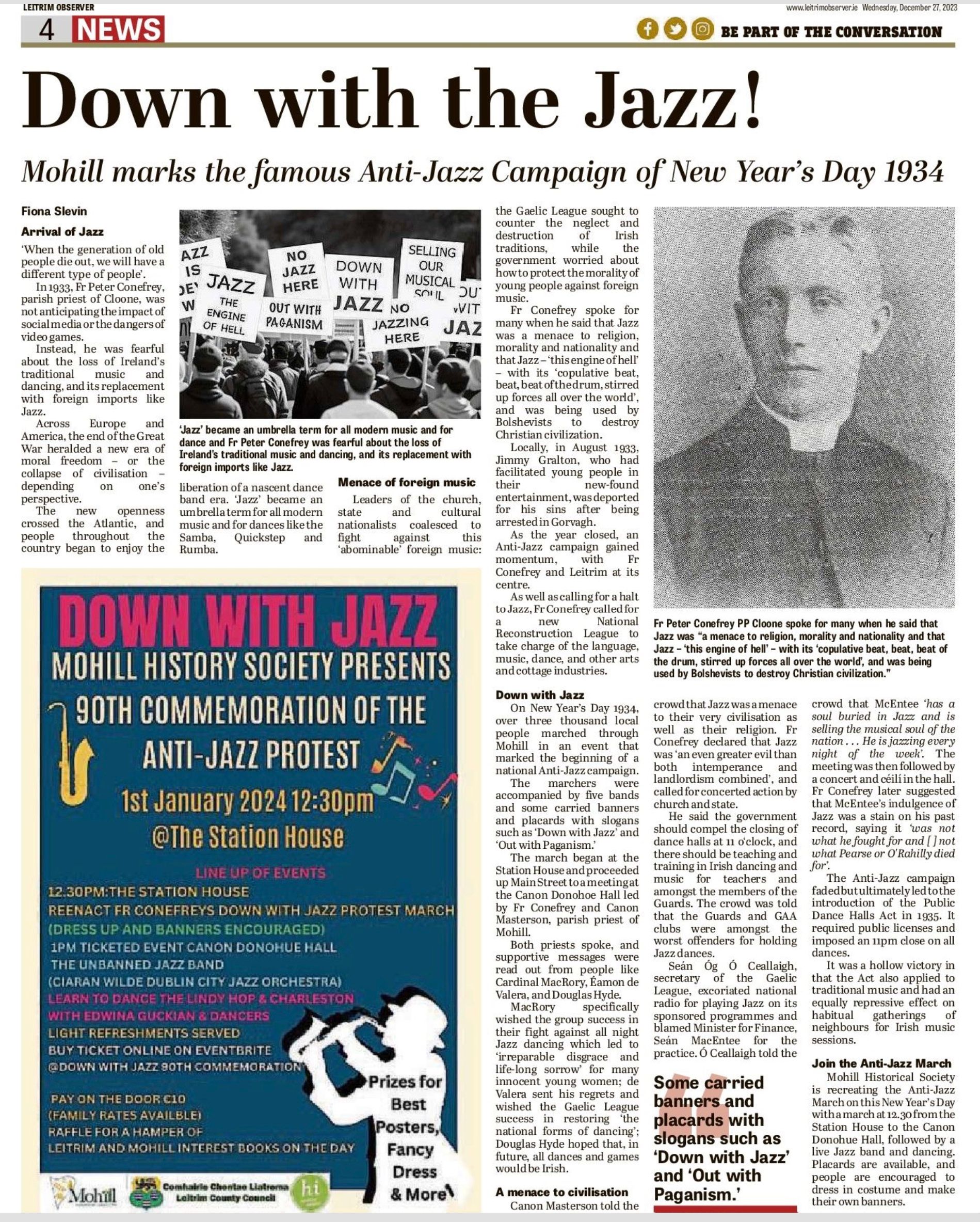
Further reading/listening:
- Cathal Brennan, The Anti-Jazz Campaign, The Irish Story, 2011
- Johannah Duffy, Jazz, Identity and Sexuality in Ireland during the Interwar Years, Irish Journal of American Studies, 2009
- Myles Dungan,
The Gaelic League bans ‘foreign dances’ and the ‘Down with Jazz’ campaign begins,
2015
- Brianna Faughnan, Jimmy Gralton: deported without trial, 2022
- Patrick Maume, Fr Peter Conefrey, Dictionary of Irish Biography
- Fiona Slevin, the Anti-Jazz speeches of Fr Peter Conefrey
- Jazzing Every Night of the Week, LeitrimAnnals.com, nd
- The Anti-Jazz Crusade in Mohill, Second-Year Class, Mohill Vocational School, 1989 (from Leitrim County Library)
- RTÉ Radio 1, Doc on One, Down with jazz: Anti jazz campaign of the 1930's, 1987
- Cosc,
RTÉ One television,
Down with Jazz

© Fiona Slevin | Last updated February 2024
This work is licensed under a Creative Commons Attribution-NonCommercial-ShareAlike 4.0 International License.